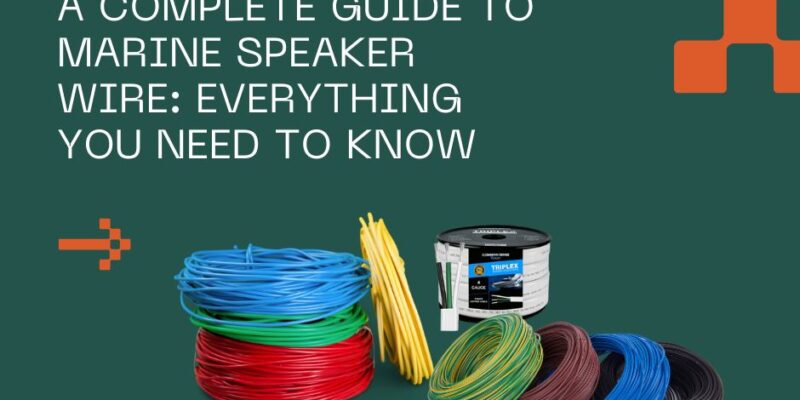Setting up a great sound system on your boat requires more than just high-quality speakers. The right marine speaker wire is equally essential to ensure clear audio performance and long-lasting durability in harsh marine conditions. This guide explores what makes marine speaker wire special, its key features, and how to choose the best option for your audio setup.
What is Marine Speaker Wire?
Marine speaker wire is a specialized type of cable designed for use in boats and watercraft. Unlike standard speaker wire, marine-grade wire is built to endure moisture, salt, UV exposure, and temperature fluctuations, ensuring consistent audio performance and long-term reliability in the challenging marine environment.
Key Features of Marine Speaker Wire
1. Corrosion Resistance
Marine speaker wires are made with tinned copper conductors to resist corrosion caused by exposure to saltwater and humidity. This feature ensures the longevity and reliability of the wire.
2. Durable Insulation
The insulation on marine speaker wires is thicker and designed to withstand UV rays, extreme temperatures, and abrasion. This protects the internal conductors from environmental damage.
3. Flexibility
Marine wires are often finely stranded, making them more flexible than standard wires. This makes them easier to route through tight or complex spaces on a boat.
4. Water Resistance
Marine speaker wires are designed to repel moisture, ensuring safe operation even in wet conditions.
Why Use Marine Speaker Wire?
Choosing the right speaker wire for your marine audio system has several advantages:
1. Improved Sound Quality
Marine-grade speaker wires are designed to maintain signal integrity, minimizing distortion and signal loss even over long distances.
2. Durability in Harsh Environments
Ordinary speaker wires degrade quickly in marine conditions. Marine-grade wires resist corrosion, wear, and UV damage, ensuring long-term performance.
3. Safety
Proper insulation reduces the risk of electrical faults, short circuits, or fire hazards.
4. Cost-Effectiveness
While marine wires may have a higher upfront cost, their durability and resistance to damage save money in the long run by reducing replacements.
How to Choose the Right Marine Speaker Wire
Selecting the right wire for your audio system involves understanding your setup’s requirements.
1. Wire Gauge (Thickness)
Wire thickness, measured in American Wire Gauge (AWG), affects the wire’s ability to handle power and maintain audio quality. Thicker wires (with lower AWG numbers) are better for long cable runs or high-power systems.
- 16 AWG: Suitable for short runs under 15 feet.
- 14 AWG: Ideal for medium runs (15–25 feet).
- 12 AWG or thicker: Recommended for long runs over 25 feet or for high-wattage speakers.
2. Material and Conductors
High-quality marine speaker wires use tinned copper for maximum conductivity and corrosion resistance. Avoid wires made with cheaper materials like aluminum, as they are less durable and conduct electricity less efficiently.
3. Environmental Considerations
Choose wires with robust, UV-resistant insulation if they will be exposed to direct sunlight. For wires that run through wet or submerged areas, ensure the wire is rated as waterproof.
4. Compliance with Standards
Look for wires certified by relevant marine standards like ABYC (American Boat and Yacht Council) or UL (Underwriters Laboratories) to ensure safety and performance.
Installation Tips for Marine Speaker Wire
Proper installation of marine speaker wire is crucial for maintaining audio quality and system reliability.
1. Plan the Layout
Map out the wire paths in advance to minimize excess length and avoid sharp bends or interference with other systems.
2. Use Marine-Grade Connectors
Pair your speaker wire with corrosion-resistant connectors for a secure and durable connection.
3. Protect Connections
Use heat-shrink tubing or liquid electrical tape to seal exposed connections, preventing moisture ingress.
4. Secure the Wire
Use cable clamps or ties to prevent wires from moving, reducing wear caused by vibration.
5. Test Before Finalizing
Test the entire audio system for performance and clarity before finalizing the installation to ensure proper connections and functionality.
Common Mistakes to Avoid
1. Using Non-Marine Wire
Ordinary speaker wires may work temporarily but will degrade quickly in marine conditions, leading to poor performance and frequent replacements.
2. Choosing the Wrong Gauge
Using a wire that’s too thin can result in signal loss and reduced sound quality, especially in long runs or high-power setups.
3. Improper Sealing of Connections
Exposed connections are prone to corrosion and can cause system failures over time.
Top Brands for Marine Speaker Wire
Several trusted brands offer marine-grade speaker wires with exceptional quality and durability:
- Common Sense Marine: Known for its premium tinned copper wires with durable insulation.
- Pactrade Marine: Offers affordable yet reliable options for marine audio systems.
- Blue Sea Systems: Renowned for high-performance marine wiring and accessories.
- Monoprice: Provides cost-effective solutions with great performance.
Conclusion
Marine speaker wire is a critical component for achieving high-quality audio and ensuring the longevity of your marine audio system. With its corrosion resistance, durable insulation, and ability to withstand the challenges of marine environments, this specialized wire outperforms standard wires in every way.
By choosing the right gauge, material, and installation practices, you can enjoy clear, reliable sound during every boating adventure. Invest in marine speaker wire today to elevate your on-water audio experience!

